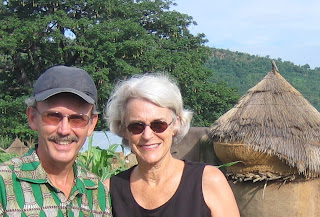New Year blessings everyone!
Before Christmas seems any farther away, we thought we would tell you a little about ours. This Christmas was so non-commercial, we would have missed it entirely if we weren't intentional about celebrating it on our own. And we now understand a little better why it is so. West Africans hardly celebrate Christmas. When asked why, one Togolese friend said "The Bible doesn't say Christmas was on December 25, and anyway, what is important is the resurrection, not his birth. And we celebrate the resurrection every Sunday." Who can argue with that train of thought?
So basically, Christmas in West Africa goes unnoticed, except that it is a day for food, family and visiting friends. No manger scenes, no gifts, not even a picture of Santa Claus to be seen. But it is a holiday, and families get together. Lots of cooking and eating. A bigger time for celebration is New Year's Eve and Day. Our French tutor described his New Year's celebration: At 8 pm, he and his family (wife, 3 children ages 3 months to 6 years) went to church and stayed with hundreds of others until 4 a.m. (yes, you are reading correctly). They worshipped, sang, and danced for about 8 hours. When the children are tired, they sleep on the floor around the perimeter, or if very young, stay attached on the mother's back. It is a big party—at the church. An hour later, at 5 a.m., all the women in town start making fu-fu, the traditional dish of mashed cassava/yams. The men start drinking "sodobé", a traditional alcohol drink made from palm wine. They sleep it off before the early afternoon when lots of visiting takes place and rice is the main dish everyone serves, because "there is always enough rice." Alcohol is served again, as one is considered a good host only if he provides plenty of alcohol (and rice) on this day. It is important to make visits to your friends (something we were not told of earlier and we are hoping we didn't offend anyone). We stayed home "under the radar" reading and napping.
For our Christmas we traveled to Ghana and attended a Lutheran church in Accra on Christmas Day (no Christmas Eve services to be found in any denomination). We sang a couple carols, and the church had a small artificial tree, balloons and streamers to mark the occasion. The 2 hour service which started with about 15 people (including us) filled up to about 200 people over half way through the service. But once it got going, it rocked. People were singing and dancing in the aisles, but not to "carols" that we recognized. The typical Lutherans that we are, we did not feel quite comfortable joining in. Especially after the pastor made the remark about people being late: "The black man has the time, but the white man has the watch". Then he said "We should be more like the white man and look at our watches" so we could start on time. (We felt a little uncomfortable wearing watches and as the only whites in the congregation.) It seems that the colonial mentality has not been yet erased in their 48 years of independence.
Our Christmas was very enjoyable and relaxing in a bungalow 30 feet from the beach (see photo). The hotel where we stayed had a loud band which played party music in the evenings, not Christmas carols, so the holiday atmosphere we are used to was lacking. But we met a lovely woman who lives and works in Accra and she invited us to have Christmas dinner with her and a friend. So we joined them at a nice hotel in town. They were both American. One, an American world trade expert who has lived in over 30 countries in 3 decades. The other, an artist from Cape Cod who fell in love with Ghana, is building a bed and breakfast on the coast.
After Christmas, we went 3 hours further west along the Ghana coast to the Cape Coast area. We were fortunate to meet a fun French-Canadian family with 4 adult daughters who we joined for the next 2 days. We walked a high-suspension rope canopy walkway above the top of a rain forest and stayed in a cottage/hotel with a lagoon that is home to a number of full gown alligators, and a restaurant that was good for bird-watching: hundreds of white egrets roosting in nearby trees and "weavers," pretty yellow birds that we watched actually weave their nests while eating our meals. But the highlight was visiting a 15th century castle which was later used for the slave trade. We will write more about this in 2 weeks…right around Martin Luther King's birthday. It was an emotional visit, and for those of you planning to visit us in Togo , it should certainly be on the itinerary.
We have not yet taken down our Christmas decorations. Plenty of time for that... just one string of lights, one red garland and a 12 inch artificial tree! We are still listening to Christmas music as we haven't quite gotten our full dose of Christmas yet. We're still burning our red and green candles, and we're still celebrating the birth of the One who gives our life meaning. We're also remembering all the blessings of 2005 and making resolutions for 2006.
To our French speaking friends, who might be wondering if we are learning anything:
Nous vous souhaitons : Une bonne et heureuse année, Santé de fer, Longévité, Prospérité, Succès dans les affaires, Paix, Bonheur, Bon chance, Beaucoup de bénédiction
And a translation for everyone else:
We wish you: A good and happy new year, Strong Health (like iron), Long life, Prosperity, Success in your business, Peace, Good times, Good luck, Plenty of blessings











